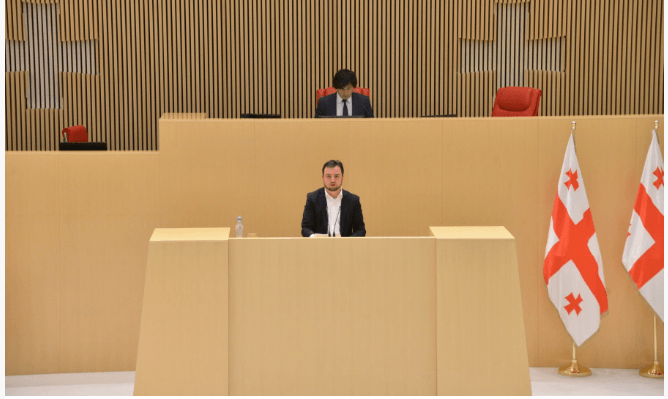Following two days of parliamentary debates, the lawmakers approved on September 21 with 73 votes to one a resolution on the controversial teen murder case in Tbilisi, which left two 16 year-olds – Davit Saralidze and Levan Dadunashvili – stabbed to death.
The resolution was drafted by the ruling Georgian Dream-Democratic Georgia party. At the very same sitting, the Parliament also took note of the conclusion of the teen murder probe commission, developed by the opposition European Georgia MPs and approved by the interim parliamentary commission, where the opposition had a majority representation.
Parliamentary debates
The Parliament launched discussions over the two documents on September 20.
Lawmakers first heard the conclusion and recommendations developed by the EG lawmakers and presented by MP Sergi Kapanadze, who chaired the interim commission. The resolution, which reflects on the GDDG conclusion, was discussed on September 21.
The ruling and the opposition MPs traded shots during the parliamentary debates. The GDDG lawmakers slammed the EG conclusion as “politicized.” “They failed to yield to political temptation,” majority leader Archil Talakvadze said at the Parliament’s sitting yesterday.
The European Georgia, which holds the parliamentary minority group status, stressed the ruling party was “a political captive,” and was unable to point at the political accountability of their team members in the executive branch.
Opinions diverged on the role of Mikheil Kalandia, one of the incident participants. While opposition lawmakers insisted on the necessity of launching criminal prosecution on group murder charges, the GDDG MPs stressed the matter was not within the commission mandate.
The EG lawmakers left the parliamentary debates before the discussion on GDDG document and did not participate in the voting process.
Two conclusions
According to the recommendations developed by the European Georgia, the prosecutor’s office should launch criminal prosecution against Mikheil Kalandia.
The EG also calls for criminal prosecution of Mirza Subeliani, a former employee of the Prosecutor’s Office, who is the father of one of the fight participants and an uncle of Mikheil Kalandia. MP Kapanadze claimed it was due to Subeliani’s involvement that “certain investigative measures were not carried out.”
The European Georgia conclusion also calls for the resignation of case investigators and prosecutors, as well as of Interior Minister Giorgi Gakharia and Justice Minister Tea Tsulukiani.
According to the conclusion drafted by the ruling majority, the Prosecutor’s Office and the Interior Ministry should conduct internal “probe” to identify whether the law had been violated by those in charge of the investigation and to respond adequately to these violations.
Moreover, the Prosecutor’s Office and the Interior Ministry should give “adequate legal assessment” to the actions of Mikheil Kalandia and Mirza Subeliani.
Background
The two 16 year-olds – Davit Saralidze and Levan Dadunashvili – were stabbed to death last December in a fight of about fifteen high school students near the prestigious 51st school in Tbilisi, in the very center of the city.
Two teenagers were arrested over the murder, but the court acquitted both suspects on group murder charges of the former, bolstering the existing doubts of Davit Saralidze’s family that the Prosecutor’s Office had concealed some elements of the crime.
The decision to establish the interim commission under opposition leadership was announced by then Prime Minister Giorgi Kvirikashvili in the early hours of June 1, shortly after the court decision prompted mass protests across the country.
A total of 79 persons were interrogated during the three-month work of the commission, including Interior Minister Giorgi Gakharia and Justice Minister Tea Tsulukiani. The commission completed its work without reaching an agreement on a joint document. Eventually, the GDDG and the European Georgia drafted two different conclusions.
This post is also available in: ქართული (Georgian) Русский (Russian)

